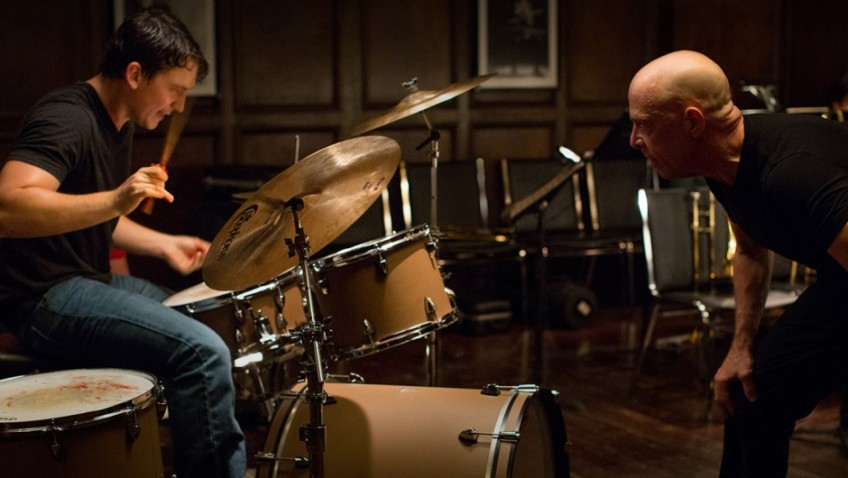Joyce Glasser reviews Whiplash (January 16, 2015)
The debut feature of 29-year-old American Writer/Director Damien Chazelle has been nominated for five Academy Awards, including Best Film and Best Supporting Actor for 60-year-old character actor JK Simmons (Up in the Air, True Grit, Juno), playing against type.
Whiplash is a fierce and intense battle of wills, waged between Andrew Neiman (Miles Teller) a lonely, Jewish, student jazz drummer, and his sadistically abusive teacher, Terence Fletcher (Simmons), at the Schaffer Conservatory in New York City.
While you are always engrossed in the drama, it does have you imagining what an Ofsted Report would make of such a dysfunctional institution. The film might also annoy jazz purists (for one thing, is Buddy Rich really a jazz great?), and composer Hank Levy’s fast, aggressive composition, Whiplash, is drummed into us with appropriate determination.
Fletcher (Simmons) is a fixture at the conservatory, the man who inspires awe and fear among students eager to be in his competitive touring band. Fletcher is cold and blunt at best and harmfully abusive and insulting at worst. He is like this with all of his students, but he reserves the torture for his favourites.
Watching Buddy Rich-obsessed, 19-year-old Andrew Neiman (Teller) practise one day, Fletcher makes a mental note to single him out as his new target, recognising the young man’s talent and drive. Fletcher is a therapist’s dream: a man with so much pent up frustration that even the layman can see he is taking out his own self-abusive feelings on others and living vicariously through Andrew.
The only sensitivity Fletcher reveals is when he emotionally explains that he had to attend the funeral of a student named Sean Casey, a ‘beautiful player’ who was killed in a car accident.
While Andrew feels his star rising, he summons up the courage to ask a girl on a date. Nicole (Melissa Benoist) is a university student working at the local cinema that Andrew frequents with his single father (Paul Reiser), and the two seem to have a good relationship. Gradually, though, Andrew breaks it off, explaining to Nicole that he needs to spend all of his time practising.
Fletcher plays one alternate drummer off against another driving them further, until Andrew is playing with bleeding fingers. We watch as Andrew allows himself to be pushed beyond endurance to prove he has what it takes to become Fletcher’s new drum alternate.
He replaces the hapless current drummer, Carl (Nate Lang) only to be replaced himself, and then reinstated. When Andrew’s resolve turns to desperation and he crashes a rental car en route to a concert, you see that the Sean Casey story is foreshadowing.
At one point in the film, when Andrew is practising Hank Levy’s Whiplash and loses the time, Fletcher throws a chair at him in front of the other musicians, accustomed to Fletcher’s humiliating abuse.
Fletcher claims he is doing no more than Jo Jones of the Count Basie Orchestra, who threw a cymbal at Charlie Parker’s head when he played badly at a jam session. According to Fletcher, the humiliation led Parker to practise so hard he turned into one of the all time greats.
If you believe Stanley Crouch’s biography ‘Kansas City Lightning,’ (and Crouch interviewed the bassist who was there that fateful evening), Chazelle, or Fletcher, gets the story wrong. The error suits the film’s purpose and fits the character of Fletcher perfectly. Fletcher lives in another world anyway.
The school itself and the lives of the students are so unrealistically sketched in that you have to look at Whiplash as an abstraction, or a kind of metaphor for education, unbridled emotion and artistic perfection.
The final section of the film becomes a familiar tale of an older man, now subdued and living with dashed hopes, being upstaged by the young man he once dominated. The denouement is several registers of intensity lower on the scale than the rest of the film, but what is it saying?
Has Fletcher proven his methods work, insofar as Andrew is doing so well now? He tells Andrew that the worst thing you can tell a young artist is ‘good job’ because complacency is the enemy of improvement.
But inherent in the Charlie Parker story is the message that true artists drive themselves harder than anyone, are their own harshest critics and always push themselves. We see this in all of life’s greats, from Van Gogh to Roger Federer.
So Fletcher’s methods are contradictory and the film, though well made and brilliantly acted, does not make much sense. Fletcher’s methods might help the mediocre student improve, but they should be superfluous for the Seans and the Andrews and, some might add, the Damien Chazelles – of the world.




